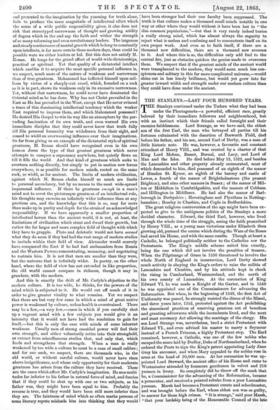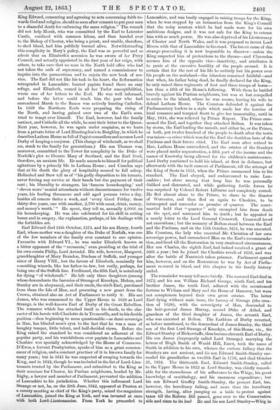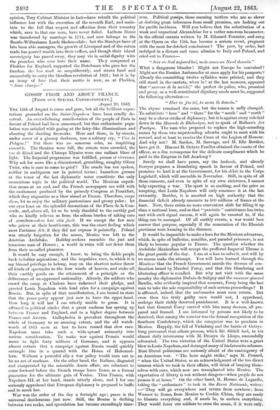THESTANLEYS.—LAST FOUR HUNDRED 'YEARS.
THE Stanleys continued under the Tudors what they had been under the Plantagenets—a powerful, efficient race, greatly beloved by their immediate followers and neighbourhood, but. with an instinct which their friends called foresight and their enemies faithlessness. Lord Strange, as we have said, the eldest. son of the first Earl, the man who betrayed all parties till his fortunes culminated with the desertion of Bosworth Field, dial before his father, and his son, second Earl of Derby, was a man of little historic note. He was, however, a favourite and constant attendant of Henry VIII., and was created by a charter of that King Lord Mohun, Basset, Burnal, and Lacy, and Lord of Man and the Isles. He died before May 13, 1522, and besides the Lancashire and other property already enumerated, most of which descended to him, died possessed of an eighth of the manor of Hunden St. Kynor, an eighth of the barony and castle of Lewes, a fourth of the manor of Brighthelmstone (the present Brighton), and nine other manors in Sussex ; of the manor of Mil- ton or Middelton in Cambridgeshire, and the manors of Cobham and Hillington in Middlesex. He had also the manor of Bar!- borough in Derbyshire ; Ileveringham and Flyntham in Notting- hamshire; Boseley in Cheshire, and Cople in Bedfordshire.
The great religious controversies of the age might have been ex- pected to give to the ambiguous politics of the Stanleys a more- decided character. Edward, the third Earl, however, who lived through the whole time of the struggle, seeing the faith proscribed by Henry VIII., as a young man victorious under Elizabeth then growing old, pursued the course which during the Wars of the Roses had saved his House, and with the same results. Though at heart a Catholic, he belonged politically neither to the Catholics nor the Protestants. The King's middle scheme suited him exactly,. being the one which did not involve the penalties of treason_ When the Pilgrimage of Grace in 1536 threatened to involve the' whole North of England in insurrection, Lord Derby showed much activity in obeying the King's orders to raise the militia of Lancashire and Cheshire, and by his attitude kept in check the rising in Cumberland, Westmoreland, and the north of his own county of Lancashire. At the coronation of King- Edward VI. he was made a Knight of the Garter, and in 154g he was appointed one of the Commissioners for advancing the Reformation. But when, in the beginning of 1549, the first Act of Uniformity was passed, he strongly resisted the disuse of the Missal,. and three years later, 1552, protested against the Act prohibiting the simoniacal practices of reserving pensions out of benefices and granting advowsons while the incumbents lived, and the next and most necessary Act allowing the marriage of the clergy. His. son Lord Strange was, nevertheless, bred a strict Protestant with Edward VI., and even advised his master to marry a Seymour- instead of a French Princess, a highly Protestant step. The Earl remained, however, a Catholic, was one of the few nobles who, escaped the snare laid by Dudley, Duke of Northumberland, when he- ordered the Peers to sign the King's patent appointing Lady Jane Grey his successor, and when Mary appealed to the nobles rose in arms at the head of 20,000 men. At her coronation he was ap- pointed Lord Steward, the ancient office of his House and came to Westminster attended by fourscore gentlemen in velvet and 218 yeomen in livery. So completely did he throw off the mask that he, a Commissioner for the advancing of the Reformation, became a persecutor, and received a pointed rebuke from a poor Lancashire yeoman. Marsh had become a Protestant curate and schoolmaster, and was brought before the Earl, whose eldest son was as guilty, to answer for those high crimes. "it is strange," said poor Marsh, "that your lordship being of the Honourable Council of the late King Edward, consenting and agreeing to acts concerning faith to- wards God and religion, should so soon after consent to put poor men to a shameful death for embracing the same religion." The remark did not help Marsh, who was committed by the Earl to Leicester Castle, confined with common felons, and then handed over to the Bishop of Chester, who being a priest, and unable, therefore, to shed blood, had him publicly burned alive. Notwithstanding this complicity in Mary's policy, the Earl was so powerful and so adroit that on Elizabeth's accession he was sworn of her Privy Council, and actually appointed in the first year of her reign, with others, to take care that no man in the North held office who had not taken the oath of supremacy, and named a commissioner to inquire into the persecutions and to enjoin the new book of ser- vice. The Earl did not like his task in his heart, the Reformation retrograded in Lancashire, hunted papists found there an easy refuge, and Elizabeth, roused in all her Tudor susceptibilities, wrote one of her letters to the Earl. He was well informed, and before the letter could reach him the peer who had surrendered Marsh to the flames was actively hunting Catholics. In 1569 the Northern Earls were preparing the rising of the North, and having gained over two of the Earl's sons, tried to tempt over himself. The Earl, however, had the family instinct, and Catholic all the while, he sent their letter to the Queen. Next year, however, he was again under suspicion, as we learn from a private letter of Lord Huntingdon's to Burghley, in which he describes Lathom House as full of Papist eounsellers and accuses Lord Derby of keeping a conjurer. (This charge of witchcraft, as we shall see, stuck to the family for generations.) His son Thomas was, moreover, committed to the Tower for complicity in the Duke of Norfolk's plot to liberate Mary of Scotland, and the Earl lived, therefore, an anxious life. He made amends to himself for political agitations by a princely life in Lathom House ; and Camden says that at his death the glory of hospitality seemed to fall asleep. Holinshed and Stow tell us of "his godly disposition to his tenants, never forcing any service at their hands but due payment of their rent ; his liberality to strangers, his 'famous housekeeping,' and eleven score' menial attendants without discontinuance for twelve years, his feeding threescore and odd aged persons twice a day, besides all comers thrice a week, and every Good Friday, these thirty-five years, one with another, 2,700 with meat, drink, money, and money's worth." He spent, they tell us, annually 4,000/. on his housekeeping. He was also celebrated for his skill in setting bones and in surgery, the explanation, perhaps, of his dealings with the forbidden art.
Earl Edward died 24th October, 1574, and his son Henry, fourth Earl, whose mother was a daughter of the Duke of Norfolk, was one of the few members of the family ever constant to one opinion. Favourite with Edward VI., he was under Elizabeth known as a bitter opponent of the "recusants," even presiding at the trial of his own cousin Philip, Lord Arundel. His wife, however, Margaret, granddaughter of Mary Brandon, Duchess of Suffolk, and younger sister of Henry VIII., lost the favour of Elizabeth, nominally for consulting wizards, like her father-in-law, but really, perhaps, for being one of the Suffolk line. Ferdinand, the fifth Earl, is noted only for dying "of witchcraft." He left only three daughters (among whose descendants the baronies of Strange of Knockyn, Mohun, and Stanley are in abeyance), and their uncle, the sixth Earl, purchased from them the Isle of Man, and procuring a new grant from the Crown, obtained also an Act of Parliament to ratify it. His son James, who was summoned to the Upper House in 1628 as Lord Strange, is the well-known Earl of Derby of the Great Rebellion. The romance which has attached itself to his death, to the cha- racter of his heroic wife Charlotte de in Tremouille, and to his double position—then beginning to seem questionable—as demi-sovereign in Man, has blinded men's eyes to the fact that he was a man of haughty temper, little talent, and half-decided views. Before the King raised the standard he was considered an adherent of the popular party, and his watchfulness over papists in Lancashire and Cheshire was specially acknowledged by the House of Commons. D'Ewes, a fervent Presbyterian, speaks of him as a great counten- ancer of religion, and a constant practiser of it in his own family for many years ; but in 1641 he was suspected of swaying towards the King, and in 1642, though he was included in the list of Lord-Lieu- tenants trusted by the Parliament, and submitted to the King as their nominee for Chester, his Puritan neighbours, headed by Mr. Rigby, a lawyer and member of Parliament, prevented the addition of Lancashire to his jurisdiction. Whether this influenced Lord Strange or not, he, on the 20th June, 1642, appeared at Preston at a county meeting as chief of the King's party, seized the magazines of Lancashire, joined the King at York, and was invested at once with both Lord-Lieutenancies. From York he proceeded to Lancashire, and was busily engaged in raising troops for the King, when he was stopped by an intimation from the King's Council that the noisy musters which he had made were for his own ambitious designs, and it was not safe for the King to entrust him with so much power. He was also deprived of his Lieutenancy of Chester and North Wales, and it was proposed to invest Lord Rivers with that of Lancashire in his stead. The latent muse of this strange proceeding it is now impossible to discover—unless the King suspected him of pretentious to the throne—and Clarendon accuses him of the opposite vice—inactivity, and attributes it to panic at the excessive hostility of the people around. It is certain that for the rut of his life he entirely lost his power over his people on the mainland—the islanders remained faithful—and that when, his father being dead, he finally declared for the King, he only raised three regiments of foot and three troops of horse— less than a fifth of his House's following. With them he battled bravely against his Puritan neighbours, but was at last compelled to retire to the island, where he was secure, leaving his wife to defend Lathom House. The Countess defended it against the Parliamentary leaders in a style which made her the heroine of local romance and tempted Scott to give her immortality, until in May, 1644, she was relieved by Prince Rupert. The Prince sum- moned the Earl, and together they attacked Bolton. It was taken by storm, the Earl leading the assault, and either he, or the Prince, or both, put twelve hundred of the people to death after the town was taken—a crime which won for the Earl the deathless hate of the Puritans and their future chief. The Earl soon after retired to Man, Lathom House surrendered, and the estates of the Stanleys were placed under sequestration, a fifth part of the income and the manor of Knowsley being allowed for the children's maintenance. Lord Derby continued to hold his island, at first in defiance, but afterwards with the tacit consent of Parliament, till the attempt of the King of Scots in 1651, when the Prince summoned him to his standard. The Earl obeyed, and endeavoured to raise Lan- cashire; but alone among that long line he was personally disliked and distrusted, and while gathering feeble forces he was surprised by Colonel Robert Lilburne and completely routed. He fled almost alone to the Prince, to share in the disaster of Worcester, and then fled on again to Cheshire, to be intercepted and surrender on promise of quarter. The court- martial held that " quarter " only exempted him from death on the spot, and sentenced him to death ; but he appealed in a manly letter to the Lord General Cromwell. Cromwell loved not executions ; but the memory of Bolton stood between the Earl and the Puritans, and on the 15th October, 1651, he was executed. His Countess, the lady who executed Mr. Christian of her own sovereign power, had surrendered Man on the Earl's recommenda- tion, and lived till the Restoration in very straitened circumstances. Her son Charles, the eighth Earl, had indeed received a grant of 500/. a year ; but he joined the Cheshire revolt of 1659, and was after the battle of Nantwich taken prisoner. Parliament spared him, however, and on the Restoration he was by Act of Parlia- ment restored in blood, and this chapter in the family history ended.
The remainder we may tell more briefly. The restored Earl died in 1672, and his son William Richard George, ninth Earl, and his brother James, the tenth Earl, adhered with the accustomed fortune to William and Mary and the House of Hanover, but were not conspicuous beyond their own great estates. The latter Earl dying without male issue, the barony of Strange (the crea- tion of 1628), with the sovereignty of Man, descended to the heir-general James Murray, second Dhke of Athol, and grandson of the third daughter of James, the seventh Earl, who was executed at Bolton. The Earldom of Derby reverted, as before mentioned, to the descendant of James Stanley, the third son of the first Lord Strange of Knockyn, of this House, viz., Sir Edward Stanley of Bickerstaffe, thus become eleventh Earl of Derby. His son James (improperly called Lord Strange) marrying the heiress of Hugh Smith of Weald Hill, Essex, took the name of Smith in addition to his own, whence the curious fallacy that the Stanleys are not ancient, and his son Edward Smith-Stanley suc- ceeded his grandfather as twelfth Earl in 1776, and died October 21, 1834. The thirteenth Earl, Edward Smith-Stanley, called to the Upper House in 1822 as Lord Stanley, was chiefly remark- able for the staunchness of his adherence to the Whigs, his great knowledge of ornithology, and his enormous expenditure ; but his son Edward Geoffry Smith-Stanley, the present Earl, has, however, the hereditary failing, and more than the hereditary strength, having, after jumping on a table to protest against taxes till the Reform Bill passed, gone over to the Conservative side and risen to its lead He and his son Lord Stanley—Whig in
opinion, Tory Cabinet Minister in fact—have rebuilt the political influence lost with the execution of the seventh Earl, and main- tain to the full that respect and affection from their tenantry which, save to that one man, have never failed. Lathom House was transferred by marriage in 1714, and now belongs to the Bootle-Wilbrahams Lords Skelmeisdale; but the Stanleys have of late been able managers, the growth of Liverpool and of the cotton trade has poured wealth into their coffers, and though their island sovereignty has passed away, they may vie in social dignity with the proudest who ever bore their name. They conquered at Flodden for England, supported the Dutchman who gave her the freedom she has used so magnificently, and strove hard and successfully to carry the bloodless revolution of 1831; but it is by an irony of fate that their motto is now, as at Flodden, " Sans changer."
































 Previous page
Previous page